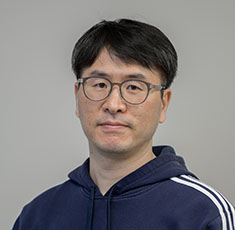
Moonsup Lee, Ph.D.
- Center for Cancer Research
- National Cancer Institute
- Building 560, Room 21-21
- Frederick, MD 21702
- 301-846-4862
- moonsup.lee@nih.gov
RESEARCH SUMMARY
My research focuses on the mechanisms of early vertebrate embryonic development, with an emphasis on developmental signaling pathways and their roles in cell fate specification, tissue organization, and morphogenesis. I initially studied these processes using Xenopus laevis, where I identified novel regulators of ciliogenesis and ciliary movement, and investigated how protein–protein interactions govern cilia formation and the behavior of ciliated cells during early development.
Building on this foundation in developmental signaling, I now apply cutting-edge imaging and gene-editing technologies to study early mammalian embryogenesis using human pluripotent stem cell-derived organoid models, including gastruloids. My current work explores how core signaling pathways—such as Wnt, Nodal, and TGF-β/BMP—coordinate to direct cell fate decisions and drive tissue patterning during gastrulation and beyond.
Areas of Expertise

Moonsup Lee, Ph.D.
Publications
Biography

Moonsup Lee, Ph.D.
Moonsup Lee received his Ph D. in Genes and Development in 2014 from the University of Texas, M.D. Anderson Cancer Center in Houston, Texas, under the supervision of Professor Pierre D. McCrea. His graduate study was focused on understanding roles of p120-catenin in pluripotency and differentiation of embryonic stem cells. Subsequently, he joined Dr. Ira Daar’s group in 2015 as a visiting fellow, and became a Research Fellow in 2020. and then joined Dr. Terry Yamaguchi's group as a Staff Scientist in 2022. Dr. Lee’s research in Yamaguchi’s lab centered around how the Wnt signaling pathway contributes to early vertebrate development.
